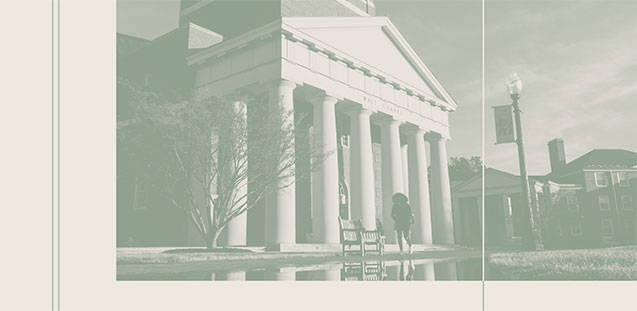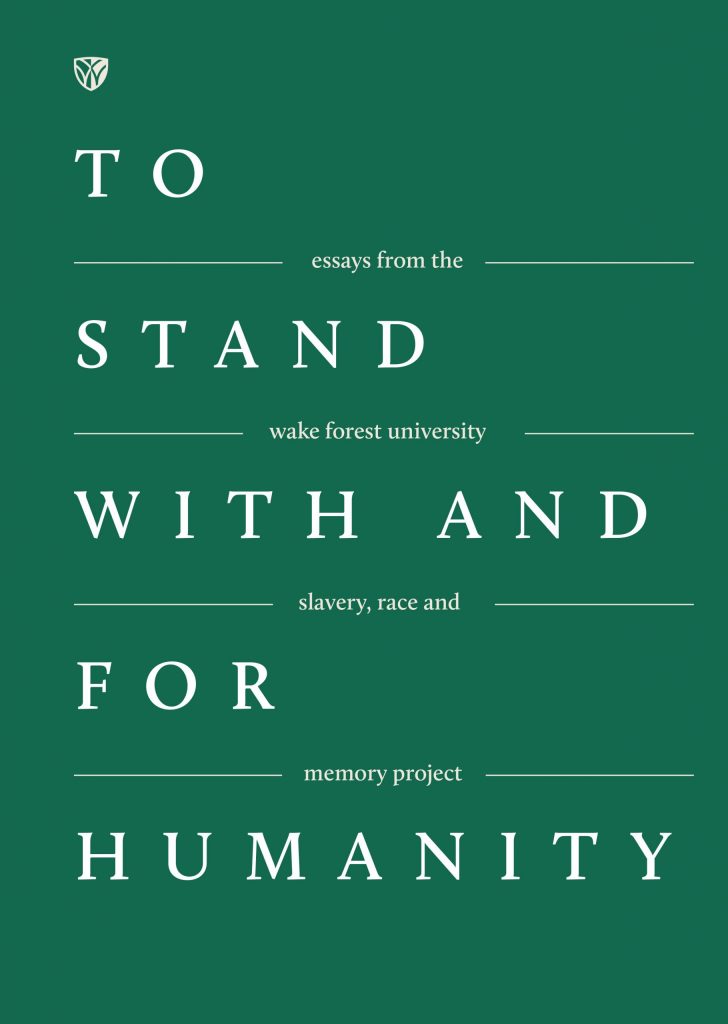Examining Our Past, Enriching our Future: The Slavery, Race and Memory Project at Wake Forest University

Reflecting on her experience as president of Brown University and Brown’s complex relationship to slavery, Ruth J. Simmons writes, “In the midst of the political turmoil around us, there is no greater mission for a university than to disclose facts, confront untruths, and uphold traditions of democracy, openness, and inclusion.”[1] It is in recognition of this continuing mission of the university that the Wake Forest University Slavery, Race, and Memory Project (“SRMP”) was created. The SRMP is a scholarly endeavor designed to help the campus community understand and acknowledge the role enslaved peoples had in building and growing our University. The Project guides research, preservation, and communication of a full and accurate depiction of the University’s relationship to slavery and its legacies and lessons for Wake Forest University.
The Project is an academically-centered, broad-based institutional initiative with three strategic foci:
Broadening Awareness
The Slavery, Race, and Memory Project broadens awareness among our campus, local and national communities regarding the role that enslaved labor played in constructing not only our country’s physical structures, but in shaping our cultural landscape as well.
- The SRMP administers Campus-Wide Engagement Grants to spur collaborative, interdisciplinary projects related to slavery and race
- The SRMP hosts faculty and student colloquia to discuss ongoing research projects and new ideas for collaborative and interdisciplinary programs.
Enriching the Academic Experience
The Slavery, Race, and Memory Project enhances the academic experience at the university by strategically initiating, supporting, and sustaining signature academic initiatives that broadens learning in the classroom, across the campus, and in our community.
- The SRMP explores and makes recommendations about the development and implementation of new academic programs consistent with the university’s mission and strategic plan, SRMP’s vision statement.The SRMP awards course development grants to support university faculty to redesign existing courses and to develop new courses that explore, among other things, the institution of slavery and its legacies, race, memory, and society, and cultures, systems, and practices of injustice and discrimination.
- The SRMP supports research grants for students and faculty studying the history of slavery and its implications.
Enhancing University Traditions
The Slavery, Race, and Memory Project examines the traditions of the university in developing a full and inclusive history of these traditions while also examining opportunities to enhance the role and function of these traditions in cultivating and sustaining a university community that fully represents our motto Pro Humanitate.
- The SRMP explores and makes recommendations to enhance existing university traditions by including previously underrepresented voices.
- The SRMP makes recommendations to appropriately commemorate the enslaved individuals whose labor helped to build this university.
The work of the Slavery, Race, and Memory Project at Wake Forest University will not be finished until we have a complete history of the University and its relationship to the institution of slavery and the lives of enslaved people and this history becomes a living part of our learning community. Wake Forest University will have a better future as we fully confront and acknowledge our past. In so doing, the University will continue and extend “a legacy that affirms and confirms the human capacity to learn, change, and grow.”[2]
[1] Ruth J. Simmons, “Slavery and Justice at Brown” in Leslie M. Harris, James T. Campbell, and Alfred L. Brophy, eds., Slavery and the University: Histories and Legacies (Athens: University of Georgia Press, 2019), 222.
[2] Ibid, 223.
‘TO STAND WITH AND FOR HUMANITY’
- Foreward
- Beyond Nostalgia: Towards an Inclusive Pro Humanitate
- An Apology
- From the Forest of Wake to Wake Forest College
- Defending the Indefensible: Wake Forest, Baptists and the Bible
- The Waits, Women and Slavery
- Reflections on the Original Wake Forest College Campus and Cemetery
- Examining Our Past, Enriching Our Future: The Slavery, Race and Memory Project at Wake Forest University
- Lest We Forget
- Selected Bibliography and University Archival Resources
- Contributors

Essays from the Wake Forest University Slavery, Race and Memory Project
Edited by Corey D.B. Walker
